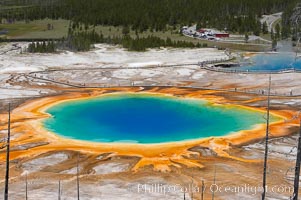
Grand Prismatic Spring (left) and Excelsior Geyser (right). Grand Prismatic Spring displays a stunning rainbow of colors created by species of thermophilac (heat-loving) bacteria that thrive in narrow temperature ranges. The blue water in the center is too hot to support any bacterial life, while the outer orange rings are the coolest water. Grand Prismatic Spring is the largest spring in the United States and the third-largest in the world. Midway Geyser Basin.
Location: Midway Geyser Basin, Yellowstone National Park, Wyoming
Image ID: 13571
Location: Midway Geyser Basin, Yellowstone National Park, Wyoming
Image ID: 13571
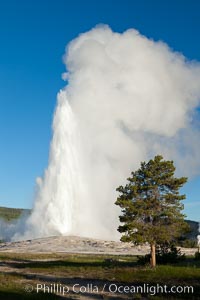
Old Faithful geyser, sunrise. Reaching up to 185' in height and lasting up to 5 minutes, Old Faithful geyser is the most famous geyser in the world and the first geyser in Yellowstone to be named.
Location: Upper Geyser Basin, Yellowstone National Park, Wyoming
Image ID: 26939
Location: Upper Geyser Basin, Yellowstone National Park, Wyoming
Image ID: 26939
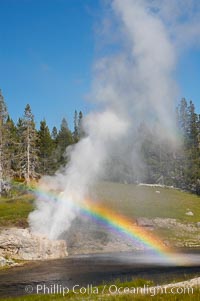
A rainbow appears in the spray of Riverside Geyser as it erupts over the Firehole River. Riverside is a very predictable geyser. Its eruptions last 30 minutes, reach heights of 75 feet and are usually spaced about 6 hours apart. Upper Geyser Basin.
Location: Upper Geyser Basin, Yellowstone National Park, Wyoming
Image ID: 13367
Location: Upper Geyser Basin, Yellowstone National Park, Wyoming
Image ID: 13367
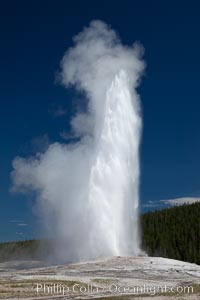
Old Faithful geyser. Reaching up to 185' in height and lasting up to 5 minutes, Old Faithful geyser is the most famous geyser in the world and the first geyser in Yellowstone to be named.
Location: Upper Geyser Basin, Yellowstone National Park, Wyoming
Image ID: 26945
Location: Upper Geyser Basin, Yellowstone National Park, Wyoming
Image ID: 26945
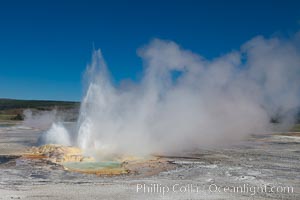
Clepsydra Geyser, a geyser which is almost continually erupting. A member of the Fountain Group of geothermal features.
Location: Lower Geyser Basin, Yellowstone National Park, Wyoming
Image ID: 26947
Location: Lower Geyser Basin, Yellowstone National Park, Wyoming
Image ID: 26947
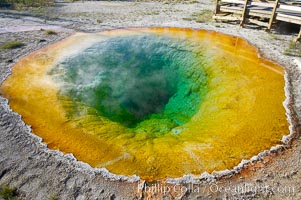
Morning Glory Pool has long been considered a must-see site in Yellowstone. At one time a road brought visitors to its brink. Over the years they threw coins, bottles and trash in the pool, reducing its flow and causing the red and orange bacteria to creep in from its edge, replacing the blue bacteria that thrive in the hotter water at the center of the pool. The pool is now accessed only by a foot path. Upper Geyser Basin.
Location: Upper Geyser Basin, Yellowstone National Park, Wyoming
Image ID: 13352
Location: Upper Geyser Basin, Yellowstone National Park, Wyoming
Image ID: 13352
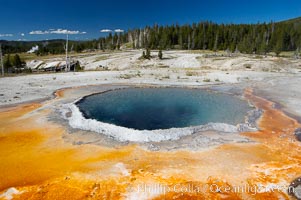
Crested Pool is a blue, superheated pool. Unfortunately, it has claimed a life. It reaches a overflowing boiling state every few minutes, then subsides a bit before building to a boil and overflow again. Upper Geyser Basin.
Location: Upper Geyser Basin, Yellowstone National Park, Wyoming
Image ID: 13355
Location: Upper Geyser Basin, Yellowstone National Park, Wyoming
Image ID: 13355
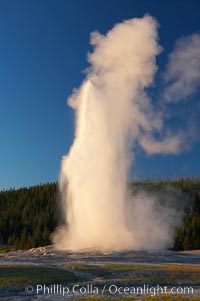
Old Faithful geyser at sunset, at peak eruption.
Location: Upper Geyser Basin, Yellowstone National Park, Wyoming
Image ID: 13361
Location: Upper Geyser Basin, Yellowstone National Park, Wyoming
Image ID: 13361
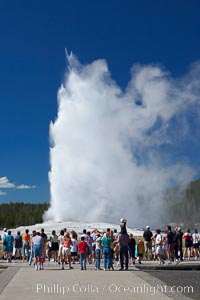
A crowd enjoys watching Old Faithful geyser at peak eruption.
Location: Upper Geyser Basin, Yellowstone National Park, Wyoming
Image ID: 13363
Location: Upper Geyser Basin, Yellowstone National Park, Wyoming
Image ID: 13363
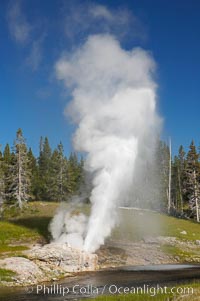
Riverside Geyser at peak eruption, arcing over the Firehole River. Riverside is a very predictable geyser. Its eruptions last 30 minutes, reach heights of 75 feet and are usually spaced about 6 hours apart. Upper Geyser Basin.
Location: Upper Geyser Basin, Yellowstone National Park, Wyoming
Image ID: 13366
Location: Upper Geyser Basin, Yellowstone National Park, Wyoming
Image ID: 13366
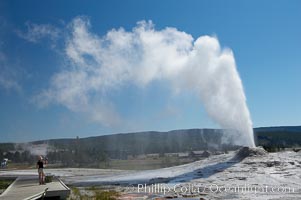
A visitor videotapes the eruption of Lion Geyser, with Old Faithful Inn visible in the distance. Lion Geyser, whose eruption is preceded by a release of steam that sounds like a lion roaring, erupts just once or a few times each day, reaching heights of up to 90 feet. Upper Geyser Basin.
Location: Upper Geyser Basin, Yellowstone National Park, Wyoming
Image ID: 13371
Location: Upper Geyser Basin, Yellowstone National Park, Wyoming
Image ID: 13371
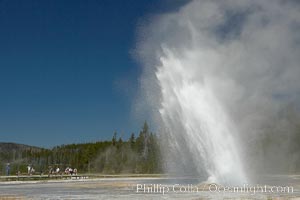
Daisy Geyser erupting with visitors visible in the distance.. Daisy Geyser, a cone-type geyser that shoots out of the ground diagonally, is predictable with intervals ranging from 120 to over 200 minutes. It reaches heights of 75 feet, lasts 3 to 4 minutes and rarely erupts in concert with nearby Splendid Geyser. Upper Geyser Basin.
Location: Upper Geyser Basin, Yellowstone National Park, Wyoming
Image ID: 13382
Location: Upper Geyser Basin, Yellowstone National Park, Wyoming
Image ID: 13382
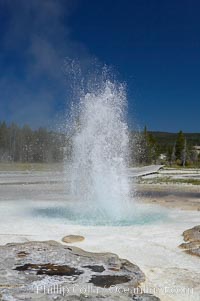
Sawmill Geyser erupting. Sawmill Geyser is a fountain-type geyser and, in some circumstances, can be erupting about one-third of the time up to heights of 35 feet. Upper Geyser Basin.
Location: Upper Geyser Basin, Yellowstone National Park, Wyoming
Image ID: 13385
Location: Upper Geyser Basin, Yellowstone National Park, Wyoming
Image ID: 13385
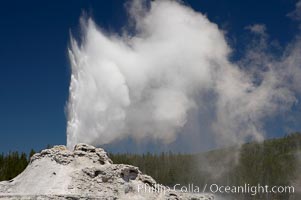
Castle Geyser erupts, reaching 60 to 90 feet in height and lasting 20 minutes. While Castle Geyser has a 12 foot sinter cone that took 5,000 to 15,000 years to form, it is in fact situated atop geyserite terraces that themselves may have taken 200,000 years to form, making it likely the oldest active geyser in the park. Upper Geyser Basin.
Location: Upper Geyser Basin, Yellowstone National Park, Wyoming
Image ID: 13417
Location: Upper Geyser Basin, Yellowstone National Park, Wyoming
Image ID: 13417
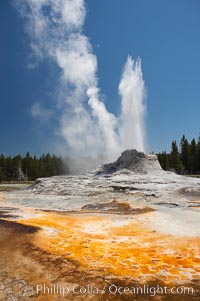
Castle Geyser erupts with the colorful bacteria mats of Tortoise Shell Spring in the foreground. Castle Geyser reaches 60 to 90 feet in height and lasts 20 minutes. While Castle Geyser has a 12 foot sinter cone that took 5,000 to 15,000 years to form, it is in fact situated atop geyserite terraces that themselves may have taken 200,000 years to form, making it likely the oldest active geyser in the park. Upper Geyser Basin.
Location: Upper Geyser Basin, Yellowstone National Park, Wyoming
Image ID: 13426
Location: Upper Geyser Basin, Yellowstone National Park, Wyoming
Image ID: 13426
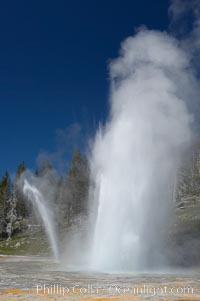
Grand Geyser erupts (right) with a simultaneous eruption from Vent Geyser (left). Grand Geyser is a fountain-type geyser reaching 200 feet in height and lasting up to 12 minutes. Grand Geyser is considered the tallest predictable geyser in the world, erupting about every 12 hours. It is often accompanied by burst or eruptions from Vent Geyser and Turban Geyser just to its left. Upper Geyser Basin.
Location: Upper Geyser Basin, Yellowstone National Park, Wyoming
Image ID: 13457
Location: Upper Geyser Basin, Yellowstone National Park, Wyoming
Image ID: 13457
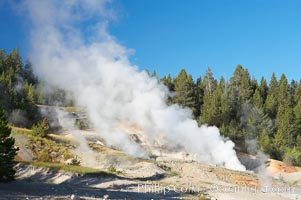
Ledge Geyser, vents releasing steam, in the Porcelain Basin area of Norris Geyser Basin.
Location: Norris Geyser Basin, Yellowstone National Park, Wyoming
Image ID: 13484
Location: Norris Geyser Basin, Yellowstone National Park, Wyoming
Image ID: 13484
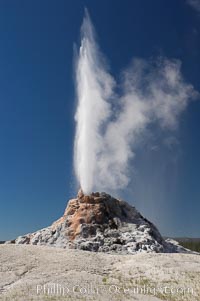
White Dome Geyser rises to a height of 30 feet or more, and typically erupts with an interval of 15 to 30 minutes. It is located along Firehole Lake Drive.
Location: Lower Geyser Basin, Yellowstone National Park, Wyoming
Image ID: 13540
Location: Lower Geyser Basin, Yellowstone National Park, Wyoming
Image ID: 13540
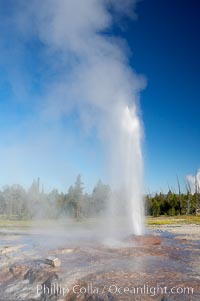
Pink Cone Geyser erupts. Pink Cone Geyser reaches 30 feet in height, and has highly variable interval and duration. It is a cone-type geyser and its cone has a pinkish tint due to manganese oxide in it. Firehole Lake Drive, Lower Geyser Basin, Yellowstone Park.
Location: Lower Geyser Basin, Yellowstone National Park, Wyoming
Image ID: 13551
Location: Lower Geyser Basin, Yellowstone National Park, Wyoming
Image ID: 13551
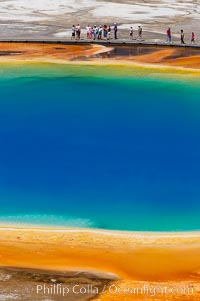
Grand Prismatic Spring displays a stunning rainbow of colors created by species of thermophilac (heat-loving) bacteria that thrive in narrow temperature ranges. The blue water in the center is too hot to support any bacterial life, while the outer orange rings are the coolest water. Grand Prismatic Spring is the largest spring in the United States and the third-largest in the world. Midway Geyser Basin.
Location: Midway Geyser Basin, Yellowstone National Park, Wyoming
Image ID: 13573
Location: Midway Geyser Basin, Yellowstone National Park, Wyoming
Image ID: 13573
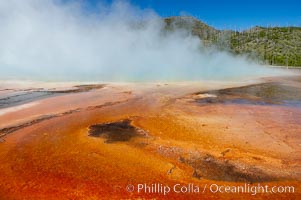
Grand Prismatic Spring displays brilliant colors along its edges, created by species of thermophilac (heat-loving) bacteria that thrive in narrow temperature ranges. The outer orange and red regions are the coolest water in the spring, where the overflow runs off. Midway Geyser Basin.
Location: Midway Geyser Basin, Yellowstone National Park, Wyoming
Image ID: 13587
Location: Midway Geyser Basin, Yellowstone National Park, Wyoming
Image ID: 13587
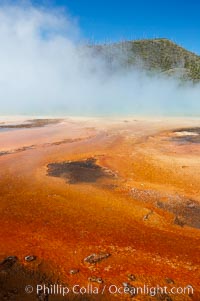
Grand Prismatic Spring displays brilliant colors along its edges, created by species of thermophilac (heat-loving) bacteria that thrive in narrow temperature ranges. The outer orange and red regions are the coolest water in the spring, where the overflow runs off. Midway Geyser Basin.
Location: Midway Geyser Basin, Yellowstone National Park, Wyoming
Image ID: 13591
Location: Midway Geyser Basin, Yellowstone National Park, Wyoming
Image ID: 13591
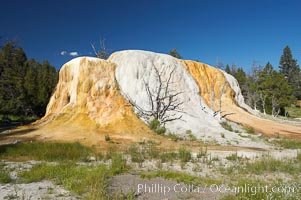
Orange Spring Mound. Many years of mineral deposition has built up Orange Spring Mound, part of the Mammoth Hot Springs complex.
Location: Mammoth Hot Springs, Yellowstone National Park, Wyoming
Image ID: 13614
Location: Mammoth Hot Springs, Yellowstone National Park, Wyoming
Image ID: 13614
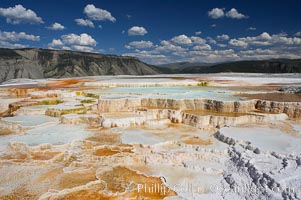
New Blue Spring and its travertine terraces, part of the Mammoth Hot Springs complex.
Location: Mammoth Hot Springs, Yellowstone National Park, Wyoming
Image ID: 13623
Location: Mammoth Hot Springs, Yellowstone National Park, Wyoming
Image ID: 13623
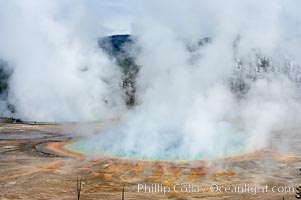
Grand Prismatic Spring steams in cold winter air.
Location: Midway Geyser Basin, Yellowstone National Park, Wyoming
Image ID: 19593
Location: Midway Geyser Basin, Yellowstone National Park, Wyoming
Image ID: 19593
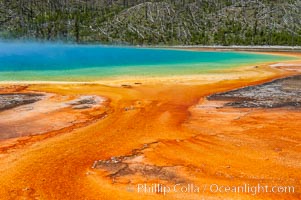
Grand Prismatic Spring displays brilliant colors along its edges, created by species of thermophilac (heat-loving) bacteria that thrive in narrow temperature ranges. The outer orange and red regions are the coolest water in the spring, where the overflow runs off.
Location: Midway Geyser Basin, Yellowstone National Park, Wyoming
Image ID: 07265
Location: Midway Geyser Basin, Yellowstone National Park, Wyoming
Image ID: 07265
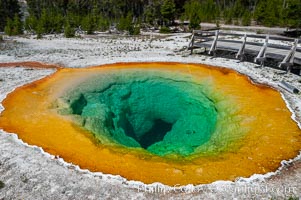
Morning Glory Pool has long been considered a must-see site in Yellowstone. At one time a road brought visitors to its brink. Over the years they threw coins, bottles and trash in the pool, reducing its flow and causing the red and orange bacteria to creep in from its edge, replacing the blue bacteria that thrive in the hotter water at the center of the pool. The pool is now accessed only by a foot path. Upper Geyser Basin.
Location: Upper Geyser Basin, Yellowstone National Park, Wyoming
Image ID: 07268
Location: Upper Geyser Basin, Yellowstone National Park, Wyoming
Image ID: 07268
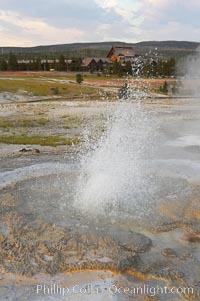
Anemone Geyser erupts, Old Faithful Inn visible in the distance. Anemone Geyser cycles about every 7 minutes. First the pools fills, then overflows, then bubbles and splashes before erupting. The eruption empties the pools and the cycle begins anew. Upper Geyser Basin.
Location: Upper Geyser Basin, Yellowstone National Park, Wyoming
Image ID: 13394
Location: Upper Geyser Basin, Yellowstone National Park, Wyoming
Image ID: 13394
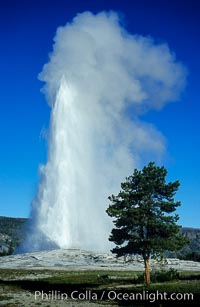
Old Faithful geyser, peak eruption.
Location: Upper Geyser Basin, Yellowstone National Park, Wyoming
Image ID: 07179
Location: Upper Geyser Basin, Yellowstone National Park, Wyoming
Image ID: 07179
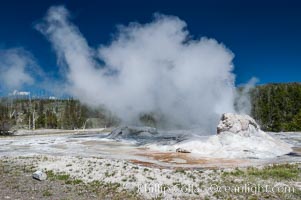
Grotto Geyser, Yellowstone National Park.
Location: Upper Geyser Basin, Yellowstone National Park, Wyoming
Image ID: 07204
Location: Upper Geyser Basin, Yellowstone National Park, Wyoming
Image ID: 07204